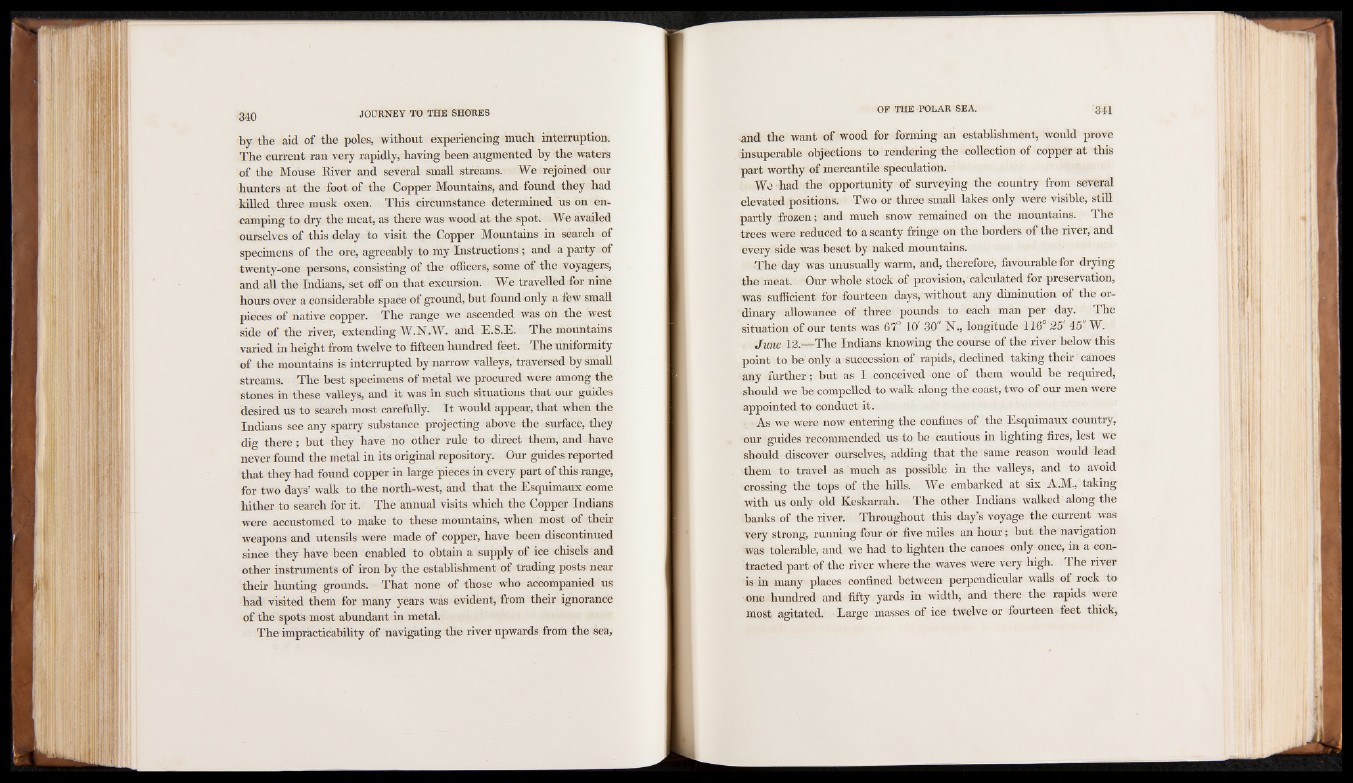
by the aid of the poles, without experiencing much interruption.
The current ran very rapidly, having been augmented by the waters
of the Mouse River and several small streams. We rejoined our
hunters at the foot of the Copper Mountains, and found they had
killed three musk oxen. This circumstance determined us on encamping
to dry the meat, as there was wood at the spot. We availed
ourselves of this delay to visit the Copper Mountains in search of
specimens of the ore, agreeably to my Instructions ; and a party of
twenty-one persons, consisting of the officers, some of the voyagers,
and all the Indians, set off on that excursion. We travelled for nine
hours over a considerable space of ground, but found only a few small
pieces of native copper. The range we ascended was oh the west
side of the river, extending W.N.W. and E.S.E. The mountains
varied in height from twelve to fifteen hundred feet. The uniformity
of the mountains is interrupted by narrow valleys, traversed by small
streams. The best specimens of metal we procured were among the
stones in these valleys, and it was in such situations that our guides
desired us to search most carefully. It would appear, that when the
Indians see any sparry substance projecting above the surface, they
dig there ; but they have no other rule to direct them, and have
never found the metal in its original, repository. Our guides reported
that they had found copper in large pieces in every part of this range,
for two days’ walk to the north-west, and that the Esquimaux come
hither to search for it. The annual visits which the Copper Indians
were accustomed to make to these mountains, when most of their
weapons and utensils were made of copper, have been discontinued
since they have been enabled to obtain a supply of ice chisels and
other instruments of iron by the establishment of trading posts near
their hunting grounds. That none of those who accompanied us
had visited them for many years was evident, from their ignorance
of the spots most abundant in metal.
The impracticability of navigating the river upwards from the sea,
and the want of wood for forming an establishment, would prove
insuperable objections to rendering the collection of copper at this
part worthy of mercantile speculation.
We had the opportunity of surveying the country from several
elevated positions. Two or three small lakes only were visible, still
partly frozen; and much snow remained on the mountains. The
trees were reduced to a scanty fringe on the borders of the river, and
every side was beset by naked mountains.
The day was unusually warm, and, therefore, favourable for drying
the meat. Our whole stock of provision, calculated for preservation,
was sufficient for fourteen days, without any diminution of the ordinary
allowance of three pounds to each man per day. The
situation of our tents was 67° 10' 30" N., longitude 116° 25' 45" W.
June 12.—The Indians knowing the course of the river below this
point to be only a succession of rapids, declined taking their canoes
any further ; but as I conceived one of them would be required,
should we be compelled to walk along the coast, two of our men were
appointed to conduct it.
As we were now entering the confines of the Esquimaux country,
our guides recommended us to be cautious in lighting fires, lest we
shotdd discover ourselves, adding that the same reason would lead
them to travel as much as possible in the valleys, and to avoid
crossing the tops of the hills. We embarked at six A.M., taking
with us only old Keskarrah. The other Indians walked along the
banks of the river. Throughout this day’s voyage the current was
very strong, running four or five miles an hour; but the navigation
was tolerable, and we had to lighten the canoes only once, in a contracted
part of the river where the waves were very high. The river
is in many places confined between perpendicular walls of rock to
one hundred and fifty yards in width, and there the rapids were
most agitated. Large masses of ice twelve or fourteen feet thick,